雅思阅读测试卷
雅思英语语言测试阅读理解 选择题 55题

1. What is the main purpose of the passage?A. To describe a historical eventB. To explain a scientific theoryC. To argue for a political policyD. To narrate a personal story2. According to the text, what is the most significant impact of climate change?A. Increased agricultural productivityB. Rising sea levelsC. Decreased biodiversityD. Economic growth3. The author mentions "quantum computing" in the passage. What is the context?A. As a solution to environmental problemsB. As a threat to traditional computingC. As a new field of studyD. As a historical development4. Which of the following best describes the tone of the passage?A. OptimisticB. PessimisticC. NeutralD. Sarcastic5. What does the passage suggest about renewable energy sources?A. They are too expensive to implementB. They are the only solution to energy needsC. They are becoming more efficientD. They are not environmentally friendly6. The passage discusses the benefits of urban planning. Which of the f ollowing is NOT mentioned?A. Reducing traffic congestionB. Improving air qualityC. Enhancing public safetyD. Increasing agricultural output7. What is the primary focus of the passage on education reforms?A. Standardized testingB. Teacher trainingC. Curriculum changesD. School infrastructure8. According to the text, what is the role of technology in modern educ ation?A. To replace teachersB. To enhance learning experiencesC. To monitor student performanceD. To reduce educational costs9. The passage on health care mentions a "revolutionary treatment." Wha t is it?A. Gene therapyB. VaccinationC. SurgeryD. Medication10. What does the author imply about the future of work?A. Automation will eliminate jobsB. Remote work will become the normC. Traditional careers will remain unchangedD. Job security will improve11. The passage on cultural diversity emphasizes which aspect?A. Economic benefitsB. Social integrationC. Political influenceD. Educational opportunities12. What is the main argument in the passage about immigration?A. It should be restrictedB. It has no impact on societyC. It benefits the economyD. It leads to cultural conflicts13. The author discusses the concept of "sustainable development." What does this term mean?A. Economic growth without environmental impactB. Balancing economic, social, and environmental needsC. Focusing only on environmental protectionD. Prioritizing social needs over economic growth14. What is the primary concern expressed in the passage about artifici al intelligence?A. Its potential to create jobsB. Its ethical implicationsC. Its cost of developmentD. Its impact on education15. The passage on global trade mentions a "shift in economic power." W hat is the cause?A. Technological advancementsB. Political alliancesC. Natural disastersD. Cultural changes16. What does the author suggest about the role of government in econom ic policy?A. It should be minimizedB. It should focus on taxationC. It should promote innovationD. It should control all industries17. The passage on environmental conservation discusses a major challen ge. What is it?A. Lack of fundingB. Public indifferenceC. Political oppositionD. Technological limitations18. What is the main theme of the passage on social media?A. Its impact on privacyB. Its role in communicationC. Its influence on politicsD. Its effect on mental health19. The author mentions "blockchain technology" in the context of which application?A. Financial transactionsB. Health recordsC. Supply chain managementD. Voting systems20. What does the passage suggest about the future of transportation?A. Increased reliance on public transitB. The dominance of electric vehiclesC. The decline of air travelD. The resurgence of horse-drawn carriages21. The passage on food security highlights a major issue. What is it?A. Overproduction of foodB. Distribution inefficienciesC. Consumer preferencesD. Agricultural subsidies22. What is the primary focus of the passage on mental health?A. Treatment optionsB. Causes of mental illnessC. Public awarenessD. Economic impacts23. The author discusses the concept of "digital literacy." What does t his involve?A. Understanding technologyB. Using social mediaC. Protecting online privacyD. All of the above24. What does the passage suggest about the role of women in leadership?A. They are underrepresentedB. They are equally capableC. They face fewer challengesD. They are less influential25. The passage on climate policy mentions a key strategy. What is it?A. Carbon taxationB. ReforestationC. Renewable energy subsidiesD. All of the above26. What is the main argument in the passage about public health?A. Prevention is better than cureB. Healthcare should be freeC. Medication is overusedD. Health education is ineffective27. The author mentions "urban sprawl." What does this term refer to?A. The expansion of citiesB. The decline of rural areasC. The growth of suburbsD. The development of infrastructure28. What does the passage suggest about the impact of globalization on culture?A. It homogenizes culturesB. It preserves cultural diversityC. It leads to cultural isolationD. It enhances cultural exchange29. The passage on economic inequality discusses a major cause. What is it?A. Tax policiesB. Education disparitiesC. Technological advancementsD. All of the above30. What is the primary focus of the passage on renewable energy?A. Solar powerB. Wind powerC. Hydroelectric powerD. All of the above31. The author discusses the concept of "net neutrality." What does thi s involve?A. Equal access to the internetB. Restricting harmful contentC. Prioritizing certain websitesD. Monitoring user activity32. What does the passage suggest about the future of education?A. More online coursesB. Increased emphasis on STEMC. Reduced government fundingD. All of the above33. The passage on public transportation mentions a key benefit. What i s it?A. Reducing trafficB. Lowering costsC. Improving accessibilityD. All of the above34. What is the main argument in the passage about food sustainability?A. Local sourcingB. Reducing wasteC. Organic farmingD. All of the above35. The author mentions "smart cities." What does this term refer to?A. Cities with advanced technologyB. Cities focused on sustainabilityC. Cities with efficient governanceD. All of the above36. What does the passage suggest about the role of technology in healt hcare?A. It improves diagnosticsB. It reduces costsC. It enhances patient careD. All of the above37. The passage on cultural heritage discusses a major threat. What is it?A. Urban developmentB. Climate changeC. Lack of fundingD. All of the above38. What is the primary focus of the passage on economic growth?A. Investment strategiesB. Consumer spendingC. InnovationD. All of the above39. The author discusses the concept of "circular economy." What does t his involve?A. Recycling materialsB. Reducing wasteC. Sustainable productionD. All of the above40. What does the passage suggest about the impact of education on soci ety?A. It reduces inequalityB. It enhances economic growthC. It improves health outcomesD. All of the above41. The passage on environmental policy mentions a key challenge. What is it?A. Public skepticismB. Political resistanceC. Technological limitationsD. All of the above42. What is the main argument in the passage about social justice?A. Equal opportunitiesB. Reducing povertyC. Addressing discriminationD. All of the above43. The author mentions "biotechnology." What is the context?A. Agricultural advancementsB. Medical treatmentsC. Environmental conservationD. All of the above44. What does the passage suggest about the future of work?A. More flexible hoursB. Increased automationC. Greater job satisfactionD. All of the above45. The passage on public health mentions a major issue. What is it?A. Access to healthcareB. Epidemic outbreaksC. Mental health stigmaD. All of the above46. What is the primary focus of the passage on sustainable agriculture?A. Organic farmingB. Reducing pesticide useC. Enhancing soil healthD. All of the above47. The author discusses the concept of "digital divide." What does thi s involve?A. Access to technologyB. Online safetyC. Internet speedD. All of the above48. What does the passage suggest about the role of government in educa tion?A. Funding schoolsB. Setting standardsC. Promoting innovationD. All of the above49. The passage on climate change mentions a key strategy. What is it?A. Reducing emissionsB. Adapting to changesC. Promoting renewable energyD. All of the above50. What is the main argument in the passage about urban planning?A. Improving infrastructureB. Enhancing public spacesC. Reducing pollutionD. All of the above51. The author mentions "green technology." What does this term refer t o?A. Renewable energy sourcesB. Energy-efficient productsC. Sustainable manufacturingD. All of the above52. What does the passage suggest about the impact of globalization on economies?A. Increased tradeB. Economic integrationC. Job creationD. All of the above53. The passage on social media mentions a major concern. What is it?A. Privacy issuesB. MisinformationC. CyberbullyingD. All of the above54. What is the primary focus of the passage on mental health?A. Treatment optionsB. Causes of mental illnessC. Public awarenessD. All of the above55. The author discusses the concept of "digital literacy." What does t his involve?A. Understanding technologyB. Using social mediaC. Protecting online privacyD. All of the above答案:1. B2. B3. A4. C5. C6. D7. C8. B9. A10. B11. B12. C13. B14. B15. A16. C17. A18. B19. A20. B21. B22. C23. D24. B25. D26. A27. A28. D29. D30. D31. A32. D33. D34. D35. D36. D37. D38. D39. D40. D41. D42. D43. D44. D45. D46. D47. A48. D49. D50. D51. D52. D53. D54. D55. D。
剑桥雅思精选阅读解析test
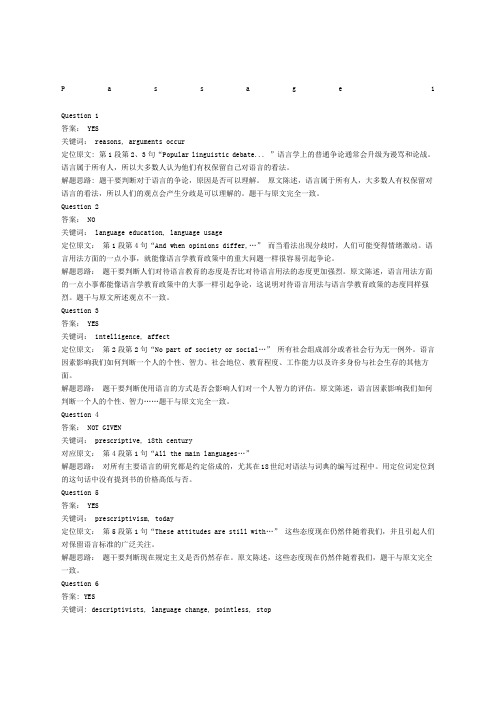
P a s s a g e 1Question 1答案: YES关键词: reasons, arguments occur定位原文: 第1段第2、3句“Popular linguistic debate... ”语言学上的普通争论通常会升级为谩骂和论战。
语言属于所有人,所以大多数人认为他们有权保留自己对语言的看法。
解题思路: 题干要判断对于语言的争论,原因是否可以理解。
原文陈述,语言属于所有人,大多数人有权保留对语言的看法,所以人们的观点会产生分歧是可以理解的。
题干与原文完全一致。
Question 2答案: NO关键词: language education, language usage定位原文:第1段第4句“And when opinions differ,…”而当看法出现分歧时,人们可能变得情绪激动。
语言用法方面的一点小事,就能像语言学教育政策中的重大问题一样很容易引起争论。
解题思路:题干要判断人们对待语言教育的态度是否比对待语言用法的态度更加强烈。
原文陈述,语言用法方面的一点小事都能像语言学教育政策中的大事一样引起争论,这说明对待语言用法与语言学教育政策的态度同样强烈。
题干与原文所述观点不一致。
Question 3答案: YES关键词: intelligence, affect定位原文:第2段第2句“No part of society or social…”所有社会组成部分或者社会行为无一例外。
语言因素影响我们如何判断一个人的个性、智力、社会地位、教育程度、工作能力以及许多身份与社会生存的其他方面。
解题思路:题干要判断使用语言的方式是否会影响人们对一个人智力的评估。
原文陈述,语言因素影响我们如何判断一个人的个性、智力……题干与原文完全一致。
Question 4答案: NOT GIVEN关键词: prescriptive, 18th century对应原文:第4段第1句“All the main languages…”解题思路:对所有主要语言的研究都是约定俗成的,尤其在18世纪对语法与词典的编写过程中。
剑桥雅思6阅读解析-Test1

READING PASSAGE 1文章结构本节考查词汇demolish [ ♎♓❍●♓☞ ] vt. 推翻rival [ ❒♋♓❖☜● ] n. 对手with ease [ ♓ ] 轻易地underpin [ ✈⏹♎☜☐♓⏹ ] v. 支撑,支持youngster [ ✈☠♦♦☜ ] n. 年青人collaborate [ ☜●✌♌☜❒♏♓♦ ] vi. 合作golfer [♊♈●♐☜☎❒✆] n. 高尔夫球手squash [ ♦♦☞ ] n. 壁球cyclist [ ♦♋✋●✋♦♦] n. 自行车运动员tweak [ ♦♦♓ ] v. 拧champion [ ♦☞✌❍☐☜⏹ ] n. 冠军slice [ ♦●♋♓♦ ] v. 切spine [ ♦☐♋♓⏹ ] n. 脊柱,脊椎wring [ ❒♓☠ ] v. 榨取unobtrusive [ ✈⏹☜♌♦❒◆♦♓❖ ] adj. 不明显的,微型的immune [ ♓❍◆⏹ ] adj. 免疫的complex [ ❍☐●♏♦ ] adj. 复杂的segment [ ♦♏♈❍☜⏹♦ ] n. 部分,章节unveil [ ✈⏹❖♏♓l ] vt. 揭开,展示endurance [ ♓⏹♎◆❒☜⏹♦ ] n. 耐力rower [ ♊❒☜☺☜☎❒✆ ] n. 划船选手replicate [ ❒♏☐●♓♓♦ ] v. 复制考题精解Questions 1-7『题型』MATCHING『解析』该题型是绝对乱序题型。
应尽量根据段落主题来大致定位到段落,然后寻找具体替换以确认答案。
Questions 8-11『题型』MATCHING『解析』大致定位:C/D两段段讲到具体应用,所以大部分应在此二段落;只有F段主题是涉及其他国家(their rivals)。
Questions 12-13『题型』SHORT-ANSWER QUESTION『解析』主题句解析1.第一段首、末句:They play hard, they play often, and they play to win…Both provide intensive coaching, training facilities and nutritional advice.解析:文章的开篇通常是背景介绍,以避免主题的切入过于突兀。
雅思英语学术写作与阅读能力测试 选择题 65题

1. According to the passage, what is the main advantage of using renewa ble energy sources?A. They are cheaper than fossil fuels.B. They reduce greenhouse gas emissions.C. They are easier to transport.D. They provide more jobs.2. The author mentions that climate change is primarily caused by:A. deforestation.B. industrial pollution.C. greenhouse gas emissions.D. volcanic eruptions.3. What does the passage suggest about the future of renewable energy?A. It will replace fossil fuels completely.B. It will be more expensive than current energy sources.C. It will require significant technological advancements.D. It will be less reliable than fossil fuels.4. The passage discusses the impact of renewable energy on:A. global trade.B. national economies.C. environmental sustainability.D. military conflicts.5. Which of the following is NOT mentioned as a challenge for renewable energy?A. Storage of energy.B. High initial costs.C. Dependence on weather conditions.D. Lack of skilled workforce.6. The author believes that the transition to renewable energy will:A. be quick and easy.B. require international cooperation.C. increase energy prices.D. reduce employment opportunities.7. What is the main focus of the passage?A. The history of renewable energy.B. The benefits of renewable energy.C. The challenges of renewable energy.D. The future of renewable energy.8. The passage implies that renewable energy technologies:A. are already widely adopted.B. need more research and development.C. are too complex for widespread use.D. are harmful to the environment.9. According to the passage, which group is most likely to benefit from renewable energy?A. Large corporations.B. Developing countries.C. Environmentalists.D. Energy companies.10. The author's tone in the passage can be described as:A. optimistic.B. pessimistic.C. neutral.D. skeptical.第11-20题:阅读以下段落,选择正确的答案。
雅思零基础测试卷
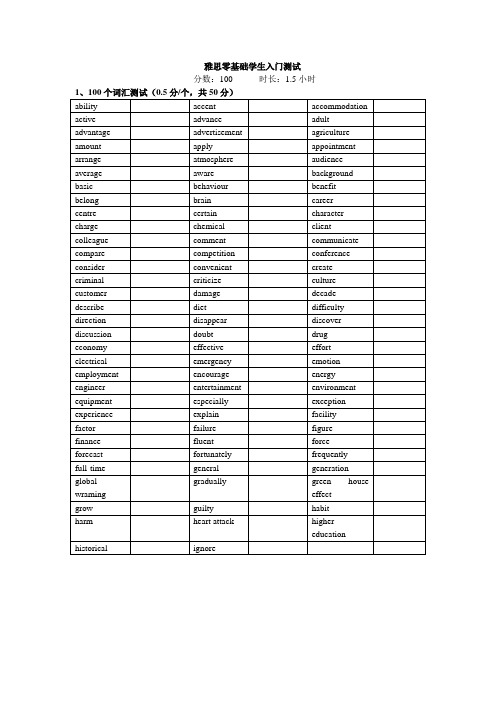
雅思零基础学生入门测试分数:100 时长:1.5小时2、听力(1分/个,共10分)LISTENINGQuestions 1-4Complete the notes below.Write NO MORE THAN THREE WORDS AND/OR A NUMBER for each answer.Questions 5-10Complete the table blew.Write NO MORE THAN THREE WORDS AND/OR A NUMBER for each answer.3、阅读(2分/个,共26分)READINGYou should spend about 20 minutes on Questions 1—13 which are based onReading below.Lost for WordsMany minority languages are on the danger listsIn the Native American Navajo nation, which sprawls across four states in the American south-west, the native language is dying. Most of its speakers are middle-aged or elderly. Although many students take classes in Navajo, the schools are run in English. Street signs,supermarket goods and even their own newspaper are all in English. Not surprisingly, linguists doubt that any native speakers of Navajo will remain in a hundred years’time.Navajo is far from alone. Half the world’s 6,800 languages are likely to vanish within two generations—that’s one language lost every ten days. Never before has the planet’s linguistic diversity shrunk at such a pace. ‘At the moment, we are heading for about three or four languages dominating the world,’ says Mark Pagel, an evolutionary biologist at the Universi ty of Reading. ‘It’s a mass extinction, and whether we will ever rebound from the loss is difficult to know.’ Isolation breeds linguistic diversity: as a result, the world is peppered with languages spoken by only a few people. Only 250 languages have more than a million speakers, and at least 3,000 have fewer than 2,500. It is not necessarily these small languages that are about to disappear. Navajo is considered endangered despite having 150,000 speakers. What makes a language endangered is not just the number of speakers, but how old they are. If it is spoken by children it is relatively safe. The critically endangered languages are those that are only spoken by the elderly, according to Michael Krauss, director of the Alassk Native Language Center, in Fairbanks.Why do people reject the language of their parents? It begins with a crisis of confidence, when a small community finds itself alongside a larger, wealthier society, says Nicholas Ostler, ofBritain’s Foundation for Endangered Languages, in Bath. ‘People lose faith in their culture,’ he says.‘When the next generation reaches their teens, they might not want to be induced into the old traditions.’The change is not always voluntary. Quite often, governments try to kill off a minority language by banning its use in public or discouraging its use in schools, all to promote national unity. The former US policy of running Indian reservation schools in English, for example, effectively put languages such as Navajo on the danger list. But Salikoko Mufwene, who chairs the Linguistics department at the University of Chicago, argues that the deadliest weapon is not government policy but economic globalization.‘Native Americans have not lost pride in their language, but they have had to adapt to socio-economic pressures,’ he says.‘They cannot refuse to speak English if most commercial activity is in English.’ But are languages worth saving? At the very least, comparisons between languages, both living and dead. When an unwritten and there is a loss of data for the study of languages and their evolution, which relies on unrecorded language disappears, it is lost to science. Language is also intimately bound up with culture, so it may be difficult to preserve one without the other.‘If a person shifts f rom Navajo to English, they lose something,’Mufwene says.‘Moreover, the loss of diversity may also deprive us of different ways of looking at the world.’says Pagel. There is mounting evidence that learning a language produces physiological changes in the b rain.‘Your brain and mine are different from the brain of someone who speaks French, for instance,’Pagel says, and this could affect our thoughts and perceptions.‘The patterns and connections we make among various concepts may be structured by the linguist ic habits of our community.’So despite linguists’best efforts, many languages will disappear over the next century. But a growing interest in cultural identity may prevent the direst predictions from coming true.‘The key to fostering diversity is for peopl e to learn their ancestral tongue, as well as the dominant language,’says Doug Whalen, founder and president of the Endangered Language Fund in New Haven, Connecticut . ‘Most of these languages will not survive without a large degree of bilingualism,’ he s ays. In New Zealand, classes for children have slowed the erosion of Maori and rekindled interest in the language. A similar approach in Hawaii has produced about 8,000 new speakers of Polynesian languages in the past few years. In California,‘apprentice’ programs have provided life support to several indigenous languages. V olunteer ‘apprentices’ pair up with one of the last living speakers of a Native American tongue to learn a traditional skill such as basket weaving, with instruction exclusively in the endangered language. After about 300 hours of training they are generally sufficiently fluent to transmit the language to the next generation. But Mufwene says that preventing a language dying out is not the same as giving it new life by using it every day. ‘Preserving a language is more like preserving fruits in a jar,’he says. However, preservation can bring a language back from the dead. There are examples of languages that have survived in written form and then been revived by later generations. But a written form is essential for this, so the mere possibility of revival has led many speakers of endangered languages to develop systems of writing where none existed before.Questions 1—4Complete the summary below.Choose NO MORE THAN TWO WORDS from the passage for each answer.Write your answers in boxes 1—4 on your answer sheet.There are currently approximately 6,800 languages in the world. This great variety of languagescame about largely as a result of geographical 1___________. But in tod ay’s world, factors such as government initiatives and 2___________ are contributing to a huge decrease in the number of languages. One factor which may help to ensure that some endangered languages do not die out completely is people’s increasing apprecia tion of their 3_________. This has been encouraged through programs of language classes for children and through‘apprentice’ schemes, in which the endangered language is used as the medium of instruction to teach people a 4__________. Some speakers of endangered languages have been produced writing systems in order to help secure the survival of their mother tongue.Questions 5—9Look at the following statements(Questions5—9)and the list of people in thebox below.Match each statement with the correct person A—E.Write the appropriate letter A—E in boxes 5—9 on your answer sheet.NB You may use any letter more than once.5 Endangered languages cannot be saved unless people learn to speak more than one language.6 Saving languages from extinction is not in itself a satisfactory goal.7 The way we think may be determined by our language.8 Young people often reject the established way of life in their community.9 A change of language may mean a loss of traditional culture.Questions 10—13Do the following statements agree with the views of the writer in ReadinPassage 1?In boxes 10—13 on your answer sheet writeYES if the statement agrees with the views of the writerNO if the statement contradicts the views of the writerNOT GIVEN if it is impossible to say what the writer thinks about this10 The Navajo language will die out because it currently has too few speakers.11 A large number of native speakers fail to guarantee the survival of a language.12 National governments could do more to protect endangered languages.13 The loss of linguistic diversity is inevitable.4、作文WRITING TASK (共14分)You should spend about 30 minutes on this task.In many countries schools have severe problems with student behaviours. What do you think are the causes of this? What solutions can you suggest?。
雅思剑12阅读真题Test5Passage1真题精讲

雅思剑12阅读真题Test5Passage1真题精讲雅思剑12阅读真题Test5Passage1原文及答案!剑桥雅思真题练习是权威的复习资料,建议每一位考生都应该做相关练习,目前剑桥雅思已经更新到12了,下面小编为大家带来雅思剑12阅读真题Test5Passage1原文及答案,供大家复习。
雅思剑12阅读真题Test5Passage1原文及题目READING PASSAGE 1You should spend about 20 minutes on Questions 1-13, which are based on Reading Passage 1 below.CorkCork - the thick bark of the cork oak tree (Quercus suber) - is a remarkable material. It is tough, elastic, buoyant, and fire-resistant, and suitable for a wide range of purposes. It has also been used for millennia: the ancient Egyptians sealed their sarcophagi (stone coffins) with cork, while the ancient Greeks and Romans used it for anything from beehives to sandals.And the cork oak itself is an extraordinary tree. Its bark grows up to 20 cm in thickness, insulating the tree like a coat wrapped around the trunk and branches and keeping the inside at a constant 20℃ all year round. Developed most probably as a defence against forest fires, the bark of the cork oak has a particular cellular structure - with about 40 million cells per cubic centimetre - that technology has never succeeded in replicating. The ceils are filled with air, which is why cork is so buoyant.It also has an elasticity that means you can squash it and watch it spring back to its original size and shape when you release the pressure.Cork oaks grow in a number of Mediterranean countries, including Portugal, Spain, Italy, Greece and Morocco. Theyflourish in warm, sunny climates where there is a minimum of 400 millimetres of rain per year, and not more than 800 millimetres. Like grape vines, the trees thrive in poor soil, putting down deep roots in search of moisture and nutrients. Southern Portugal’s Alentejo region meets all of these requirements, which explains why, by the early 20th century, this region had become the world’s largest producer of cork, and why today it accounts for roughly half of all cork production around the world.Most cork forests are family-owned. Many of these family businesses, and indeed many of the trees themselves, are around 200 years old. Cork production is, above all, an exercise in patience. From the planting of a cork sapling to the first harvest takes 25 years, and a gap of approximately a decade must separate harvests from an individual tree. And for top-quality cork, it’s necessary to wait a further 15 or 20 years. You even have to wait for the right kind of summer’s day to harvest cork. If the bark is stripped on a day when it’s too cold - or when the air is damp - the tree will be damaged.Cork harvesting is a very specialised profession. No mechanical means of stripping cork bark has been invented, so the job is done by teams of highly skilled workers. First, they make vertical cuts down the bark using small sharp axes, then lever it away in pieces as large as they can manage. The most skilful cork- strippers prise away a semi-circular husk that runs the length of the trunk from just above ground level to the first branches. It is then dried on the ground for about four months, before being taken to factories, where it is boiled to kill any insects that might remain in the cork. Over 60% of cork then goes on to be made into traditional bottle stoppers, with most of the remainder being used in the construction trade. Corkboard andcork tiles are ideal for thermal and acoustic insulation, while granules of cork are used in the manufacture of concrete.Recent years have seen the end of the virtual monopoly of cork as the material for bottle stoppers, due to concerns about the effect it may have on the contents of the bottle. This is caused by a chemical compound called 2,4,6-trichloroanisole (TCA), which forms through the interaction of plant phenols, chlorine and mould. The tiniest concentrations - as little as three or four parts to a trillion - can spoil the taste of the product contained in the bottle. The result has been a gradual yet steady move first towards plastic stoppers and, more recently, to aluminium screw caps. These substitutes are cheaper to manufacture and, in the case of screw caps, more convenient for the user.The classic cork stopper does have several advantages, however. Firstly, its traditional image is more in keeping with that of the type of high quality goods with which it has long been associated. Secondly - and very importantly - cork is a sustainable product that can be recycled without difficulty. Moreover, cork forests are a resource which support local biodiversity, and prevent desertification in the regions where they are planted. So, given the current concerns about environmental issues, the future of this ancient material once again looks promising.following statements agree with the information given in Reading Passage 1?In boxes 1-5 on your answer sheet, writeTRUE if the statement agrees with the informationFALSE if the statement contradicts the informationNOT GIVEN if there is no information on this1 The cork oak has the thickest bark of any living tree.2 Scientists have developed a synthetic cork with the same cellular structure as natural cork.3 Individual cork oak trees must be left for 25 years between the first and second harvest.4 Cork bark should be stripped in dry atmospheric conditions.5 The only way to remove the bark from cork oak trees is by hand.Questions 6-13Complete the notes below.Choose ONE WORD ONLY from the passage for each answer.Write your answers in boxes 6-13 on your answer sheet.Comparison of aluminium screw caps and cork bottle stoppersAdvantages of aluminium screw capsdo not affect the 6 ______ of the bottle contentsare 7 ______ to produceare 8 ______ to useAdvantages of cork bottle stopperssuit the 9 ______ of quality productsmade from a 10 ______ materialeasily 11 ______cork forests aid 12 ______cork forests stop 13 ______ happening雅思剑12阅读Test5 Passage1答案解析Test 5 Passage 1Question 1答案:NOT GIVEN关键词:cork oak; thickest bark定位原文:第二段第二句“Its bark grows up to 20cm in thickness, insulating the tree….”解题思路:原文只提到软木橡树的树皮能长到20厘米的厚度,并未提到它的树皮是否是所有树中最厚的。
雅思og test 5 阅读 解析
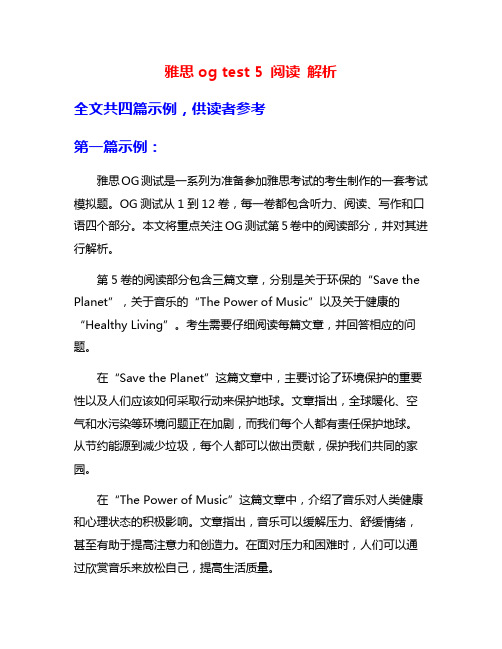
雅思og test 5 阅读解析全文共四篇示例,供读者参考第一篇示例:雅思OG测试是一系列为准备参加雅思考试的考生制作的一套考试模拟题。
OG测试从1到12卷,每一卷都包含听力、阅读、写作和口语四个部分。
本文将重点关注OG测试第5卷中的阅读部分,并对其进行解析。
第5卷的阅读部分包含三篇文章,分别是关于环保的“Save the Planet”,关于音乐的“The Power of Music”以及关于健康的“Healthy Living”。
考生需要仔细阅读每篇文章,并回答相应的问题。
在“Save the Planet”这篇文章中,主要讨论了环境保护的重要性以及人们应该如何采取行动来保护地球。
文章指出,全球暖化、空气和水污染等环境问题正在加剧,而我们每个人都有责任保护地球。
从节约能源到减少垃圾,每个人都可以做出贡献,保护我们共同的家园。
在“The Power of Music”这篇文章中,介绍了音乐对人类健康和心理状态的积极影响。
文章指出,音乐可以缓解压力、舒缓情绪,甚至有助于提高注意力和创造力。
在面对压力和困难时,人们可以通过欣赏音乐来放松自己,提高生活质量。
最后一篇文章“Healthy Living”讨论了健康生活的重要性。
文章强调了良好的饮食习惯、充足的睡眠和适量的运动对于保持健康的重要性。
只有通过均衡的生活方式,人们才能保持身体和心理的健康,享受更好的生活质量。
在阅读这三篇文章后,考生会面对一系列与文章内容相关的问题。
这些问题可能涉及文章的主旨、细节、作者意图等方面,考生需要根据文章内容正确回答问题,同时练习阅读理解能力。
通过参加雅思OG测试的阅读部分,考生可以提高自己的阅读理解能力,扩大词汇量,增强阅读速度和准确性。
这对于备考雅思考试是非常有帮助的,因为阅读部分在雅思考试中占有很大的比重,考生需要在有限的时间内快速理解文章并回答问题。
雅思OG测试第5卷的阅读部分为备考雅思考试的考生提供了宝贵的练习机会。
剑桥雅思8阅读Test1Passage3
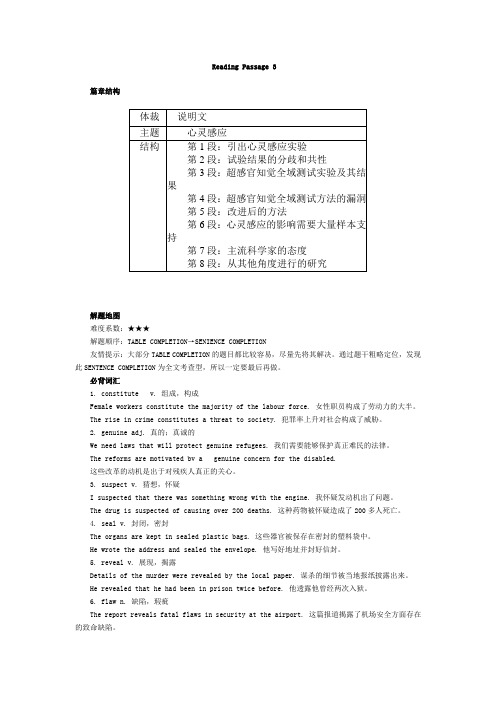
Reading Passage 3篇章结构解题地图难度系数:★★★解题顺序:TABLE COMPLETION→SENIENCE COMPLETION友情提示:大部分TABLE COMPLETION的题目都比较容易,尽量先将其解决。
通过题干粗略定位,发现此SENTENCE COMPLETION为全文考查型,所以一定要最后再做。
必背词汇1. constitute v. 组成,构成Female workers constitute the majority of the labour force. 女性职员构成了劳动力的大半。
The rise in crime constitutes a threat to society. 犯罪率上升对社会构成了威胁。
2. genuine adj. 真的;真诚的We need laws that will protect genuine refugees. 我们需要能够保护真正难民的法律。
The reforms are motivated bv a genuine concern for the disabled.这些改革的动机是出于对残疾人真正的关心。
3. suspect v. 猜想,怀疑I suspected that there was something wrong with the engine. 我怀疑发动机出了问题。
The drug is suspected of causing over 200 deaths. 这种药物被怀疑造成了200多人死亡。
4. seal v. 封闭,密封The organs are kept in sealed plastic bags. 这些器官被保存在密封的塑料袋中。
He wrote the address and sealed the envelope. 他写好地址并封好信封。
5. reveal v. 展现,揭露Details of the murder were revealed by the local paper. 谋杀的细节被当地报纸披露出来。
剑桥雅思14test2阅读解析

剑桥雅思14test2阅读解析
雅思(IELTS)是国际英语语言测试系统,常用于评估非英语母语者的英语能力。
剑桥雅思14test2是雅思考试的一套模拟试卷,本文将对其中的阅读部分进行解析。
剑桥雅思14test2阅读部分共包含三篇文章,涵盖了不同的主题和文体。
在本次解析中,将侧重于介绍每篇文章的主题和主要观点,以及阅读技巧和解题思路的分享。
首先,第一篇文章题为《一千年来的冰解》,主题涉及了古代地球气候变化。
文章主要论述了过去一千年间地球的冰川融化情况以及对人类的影响。
在阅读过程中,建议重点关注和理解作者在文章中提到的冰川退缩的原因和全球气温升高的关系,因为这是解决相关题目的关键信息。
第二篇文章题为《儿童研究的发展》,介绍了儿童研究领域的发展历程和相关研究方法。
文章主要阐述了儿童研究的重要性以及如何通过观察和实验来获得儿童行为的数据。
在解题过程中,可以注意文章中提到的儿童研究的意义和儿童发展的不同阶段。
最后一篇文章题为《生物钟的重要性》,讲述了生物钟对人类和其他生物的影响。
文章主要指出了生物钟对健康、睡眠和少数民族等方面的重要性。
在解题过程中,关注生物钟对活动规律和社会行为的影响,以及生物钟失调可能引发的问题,将有助于回答问题和选择正确答案。
综上所述,剑桥雅思14test2阅读部分涵盖了古代地球气候变化、儿童研究的发展以及生物钟的重要性等不同主题。
阅读时,应重点关注每篇文章的主题、作者观点以及关键信息,灵活运用解题技巧和思路,帮助提高阅读理解及解题能力。
剑桥雅思6test4阅读passage 2题目
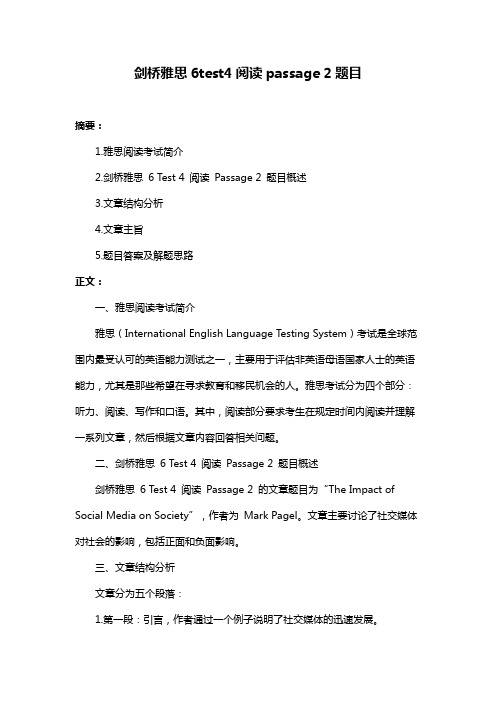
剑桥雅思6test4阅读passage 2题目摘要:1.雅思阅读考试简介2.剑桥雅思6 Test 4 阅读Passage 2 题目概述3.文章结构分析4.文章主旨5.题目答案及解题思路正文:一、雅思阅读考试简介雅思(International English Language Testing System)考试是全球范围内最受认可的英语能力测试之一,主要用于评估非英语母语国家人士的英语能力,尤其是那些希望在寻求教育和移民机会的人。
雅思考试分为四个部分:听力、阅读、写作和口语。
其中,阅读部分要求考生在规定时间内阅读并理解一系列文章,然后根据文章内容回答相关问题。
二、剑桥雅思6 Test 4 阅读Passage 2 题目概述剑桥雅思6 Test 4 阅读Passage 2 的文章题目为“The Impact of Social Media on Society”,作者为Mark Pagel。
文章主要讨论了社交媒体对社会的影响,包括正面和负面影响。
三、文章结构分析文章分为五个段落:1.第一段:引言,作者通过一个例子说明了社交媒体的迅速发展。
2.第二段:社交媒体的正面影响,包括便捷的信息传播和让人们更容易建立联系。
3.第三段:社交媒体的负面影响,如侵犯隐私、网络欺凌等。
4.第四段:社交媒体对青少年的影响,包括成瘾问题和影响心理健康。
5.第五段:结论,作者指出社交媒体既有正面也有负面影响,我们需要学会如何平衡这两方面。
四、文章主旨文章主要讨论了社交媒体对社会的影响,包括正面和负面影响,并强调了学会平衡这两方面的重要性。
五、题目答案及解题思路根据文章的内容,我们可以得出以下题目的答案:1.【问题】What is the main topic of the passage?【答案】The Impact of Social Media on Society2.【问题】What are the positive effects of social media mentioned in the passage?【答案】Convenient information dissemination and easier connection between people.3.【问题】What are the negative effects of social media mentioned in the passage?【答案】Invasion of privacy and cyberbullying.4.【问题】What is the author"s attitude towards social media?【答案】The author believes that social media has both positive andnegative effects, and we need to learn how to balance these two aspects.在解题过程中,我们需要仔细阅读文章,理解每个段落的主旨,然后根据题目要求在文章中找到相关信息。
雅思阅读真题解析与答案2023年

雅思阅读真题解析与答案2023年雅思(IELTS)阅读考试是国际英语语言测试系统的一部分,用于评估考生在阅读理解方面的能力。
考生在备考过程中,需要熟悉真题,并进行解析和答案的掌握。
本文将为大家提供2023年雅思阅读真题解析与答案。
第一篇真题及答案解析:文章主题:环境保护题目:Environmentally Friendly Travel Options原文摘录:In recent years, many people have become more aware ofthe negative impact of air travel on the environment. As a result, individuals and organizations have been looking for alternative, environmentallyfriendly travel options. One such option gaining popularity is train travel.答案解析:这篇文章主要讨论了环境友好型旅行方式,解决了人们对空中旅行对环境的负面影响的担忧。
其中提到铁路旅行作为一种环境友好型的旅行方式备受青睐。
第二篇真题及答案解析:文章主题:社会问题题目:The Impact of Social Media原文摘录:Social media has revolutionized the way we communicate and connect with others. However, it also has its downsides. One majorimpact of social media is the increased feeling of isolation and loneliness among individuals.答案解析:这篇文章主要探讨了社交媒体的影响。
剑桥雅思5 test1阅读解析
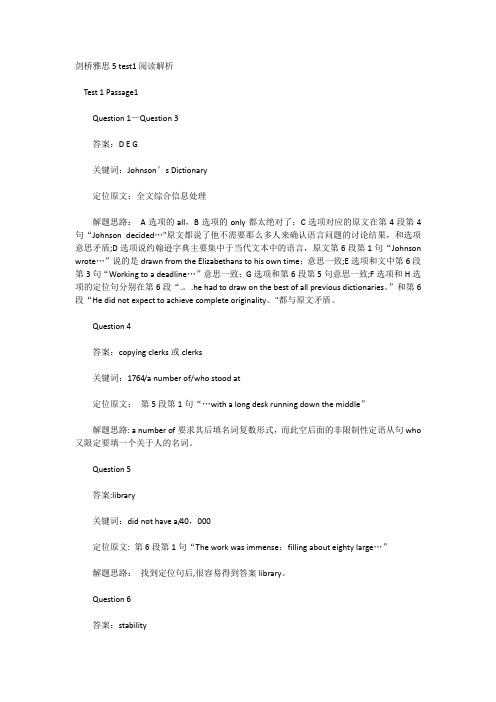
剑桥雅思5 test1阅读解析Test 1 Passage1Question 1—Question 3答案:D E G关键词:Johnson’s Dictionary定位原文:全文综合信息处理解题思路:A选项的all,B选项的only都太绝对了;C选项对应的原文在第4段第4句“Johnson decided…"原文都说了他不需要那么多人来确认语言问题的讨论结果,和选项意思矛盾;D选项说约翰逊字典主要集中于当代文本中的语言,原文第6段第1句“Johnson wrote…”说的是drawn from the Elizabethans to his own time;意思一致;E选项和文中第6段第3句“Working to a deadline…”意思一致;G选项和第6段第5句意思一致;F选项和H选项的定位句分别在第6段“.。
.he had to draw on the best of all previous dictionaries。
”和第6段“He did not expect to achieve complete originality。
"都与原文矛盾。
Question 4答案:copying clerks或clerks关键词:1764/a number of/who stood at定位原文:第5段第1句“…with a long desk running down the middle”解题思路: a number of要求其后填名词复数形式,而此空后面的非限制性定语从句who 又限定要填一个关于人的名词。
Question 5答案:library关键词:did not have a/40,000定位原文: 第6段第1句“The work was immense:filling about eighty large…”解题思路:找到定位句后,很容易得到答案library。
雅思托福10分钟模拟测试卷
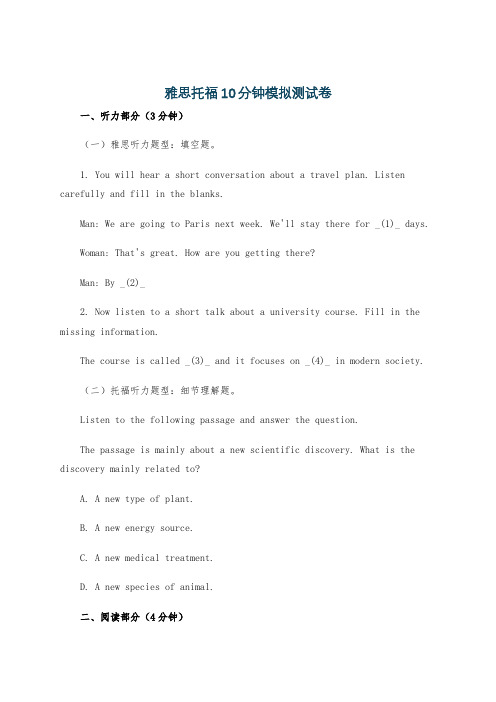
雅思托福10分钟模拟测试卷一、听力部分(3分钟)(一)雅思听力题型:填空题。
1. You will hear a short conversation about a travel plan. Listen carefully and fill in the blanks.Man: We are going to Paris next week. We'll stay there for _(1)_ days.Woman: That's great. How are you getting there?Man: By _(2)_2. Now listen to a short talk about a university course. Fill in the missing information.The course is called _(3)_ and it focuses on _(4)_ in modern society.(二)托福听力题型:细节理解题。
Listen to the following passage and answer the question.The passage is mainly about a new scientific discovery. What is the discovery mainly related to?A. A new type of plant.B. A new energy source.C. A new medical treatment.D. A new species of animal.二、阅读部分(4分钟)(一)雅思阅读题型:判断题。
Read the following passage and decide whether the statements are True, False or Not Given.Passage: The History of Coffee.Coffee has a long and interesting history. It was first discovered in Ethiopia, where it grew wild. From there, it spread to the Arabian Peninsula. By the 15th century, coffee had become a popular drink in the Middle East.1. Coffee was first found in Arabia. _(5)_2. Coffee became popular in the Middle East in the 15th century. _(6)_(二)托福阅读题型:词汇题。
雅思阅读测试题
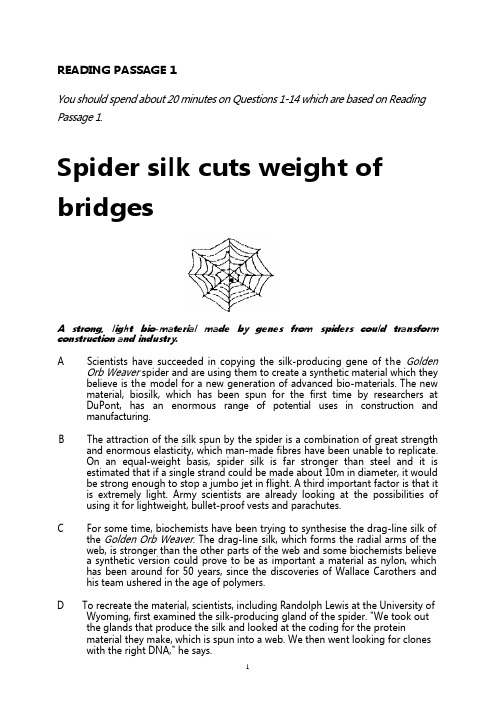
READING PASSAGE 1You should spend about 20 minutes on Questions 1-14 which are based on Reading Passage 1.Spider silk cuts weight ofbridgesA strong, light bio-material made by genes from spiders could transform construction and industry.A Scientists have succeeded in copying the silk-producing gene of the GoldenOrb Weaver spider and are using them to create a synthetic material which they believe is the model for a new generation of advanced bio-materials. The new material, biosilk, which has been spun for the first time by researchers at DuPont, has an enormous range of potential uses in construction and manufacturing.B The attraction of the silk spun by the spider is a combination of great strengthand enormous elasticity, which man-made fibres have been unable to replicate.On an equal-weight basis, spider silk is far stronger than steel and it is estimated that if a single strand could be made about 10m in diameter, it would be strong enough to stop a jumbo jet in flight. A third important factor is that it is extremely light. Army scientists are already looking at the possibilities of using it for lightweight, bullet-proof vests and parachutes.C For some time, biochemists have been trying to synthesise the drag-line silk ofthe Golden Orb Weaver. The drag-line silk, which forms the radial arms of the web, is stronger than the other parts of the web and some biochemists believea synthetic version could prove to be as important a material as nylon, whichhas been around for 50 years, since the discoveries of Wallace Carothers and his team ushered in the age of polymers.D To recreate the material, scientists, including Randolph Lewis at the University ofWyoming, first examined the silk-producing gland of the spider. "We took outthe glands that produce the silk and looked at the coding for the proteinmaterial they make, which is spun into a web. We then went looking for clones with the right DNA," he says.E At DuPont, researchers have used both yeast and bacteria as hosts to grow theraw material, which they have spun into fibres. Robert Dorsch, DuPont’s director of biochemical development, says the globules of protein, comparable with marbles in an egg, are harvested and processed. "We break open the bacteria, separate out the globules of protein and use them as the raw starting material. With yeast, the gene system can be designed so that the material excretes the protein outside the yeast for better access," he says.F "The bacteria and the yeast produce the same protein, equivalent to that whichthe spider uses in the drag lines of the web. The spider mixes the protein into a water-based solution and then spins it into a solid fibre in one go. Since we are not as clever as the spider and we are not using such sophisticated organisms, we substituted man-made approaches and dissolved the protein in chemical solvents, which are then spun to push the material through small holes to form the solid fibre.”G Researchers at DuPont say they envisage many possible uses for a new biosilkmaterial. They say that earthquake-resistant suspension bridges hung from cables of synthetic spider silk fibres may become a reality. Stronger ropes, safer seat belts, shoe soles that do not wear out so quickly and tough new clothing are among the other applications. Biochemists such as Lewis see the potential range of uses of biosilk as almost limitless. "It is very strong and retains elasticity; there are no man-made materials that can mimic both these properties. It is also a biological material with all the advantages that has over petrochemicals," he says.H At DuPond’s laboratories, Dorsc h is excited by the prospect of newsuper-strong materials but he warns they are many years away. "We are at an early stage but theoretical predictions are that we will wind up with a very strong, tough material, with an ability to absorb shock, which is stronger and tougher than the man-made materials that are conventionally available to us,"he says.I The spider is not the only creature that has aroused the interest of materialscientists. They have also become envious of the natural adhesive secreted by the sea mussel. It produces a protein adhesive to attach itself to rocks. It is tedious and expensive to extract the protein from the mussel, so researchers have already produced a synthetic gene for use in surrogate bacteria.Questions 1-5The passage has nine paragraphs A-I.Which paragraph contains the following information?Write the correct letter A-I in boxes 1-5 on your answer sheet.1 a comparison of the ways two materials are used to replace silk-producingglands2 predictions regarding the availability of the synthetic silk3 on-going research into other synthetic materials4 the research into the part of the spider that manufactures silk5 the possible application of the silk in civil engineeringQuestions 6- 11Complete the flow chart below.Choose NO MORE THAN THREE WORDS from the passage for each answer. Write your answers in boxes 6-11 on your answer sheet..Synthetic gene growth in 6_______ or 7_________globules of 8 ________dissolved in 9__________passed through 10 ________to produce 11 ___________Questions 12- 14Do the following statements agree with the information given in Reading Passage 1?In boxes 12-14 on your answer sheet writeTRUE if the statement agrees with the informationFALSE if the statement contradicts the informationNOT GIVEN if there is no information on this12 Biosilk has already replaced nylon in parachute manufacture.13 The spider produces silk of varying strengths.14 Lewis and Dorsch co-operated in the synthetic production of silk. READING PASSAGE 2You should spend about 20 minutes on Questions 15-27 which are based on Reading Passage 2.TEACHING IN UNIVERSITIESIn the 19th century, an American academic, Newman, characterised a university as:“a place of teaching universal kn owledge…(a plane for)the diffusion and extension of knowledge rather than itsadvancement.”Newman argued that if universities were not for teaching but rather for scientific discovery, then they would not need students.Interestingly, during this century, while still teaching thousands of students each year, the resources of most universities have been steadily channelled away from teaching into research activities. Most recently, however, there have been strong moves in both North America and the United Kingdom to develop initiatives that would enhance the profile of the teaching institutions of higher education. In the near future, therefore, as well as the intrinsic rewards gained from working with students and the sense that they are contributing to their overall growth and development, there should soon be extrinsic rewards, in the form of job promotion, for those pursuing academic excellence in teaching in universities.In the future, there will be more focus in universities on the quality of their graduates and their progression rates. Current degree courses, whose assessment strategies require students to learn by rote and reiterate the course material, and which do not require the student to interact with the material, or construct a personal meaning about it or even to understand the discipline, are resulting in poor learning outcomes. This traditional teaching approach does not take into account modern theories of education, the individual needs of the learner, nor his or her prior learning experience.In order for universities to raise both the quality and status of teaching, it is first necessary to have some kind of understanding of what constitutes good practice. A 1995 report, compiled in Australia, lists eight qualities that researchers agree are essential to good teaching.Good teachers...A are themselves good learners - resulting in teaching that is dynamic, reflectiveand constantly evolving as they learn more and more about teaching;B display enthusiasm for their subject and the desire to share it with their students;C recognise the importance of context and adjust their teaching accordingly;D encourage deep learning approaches and are concerned with developing theirstudents' critical thinking skills, problem solving skills and problem-approach behaviours:E demonstrate an ability to transform and extend knowledge, rather than merelytransmit it;F recognise individual differences in their students and take advantage of these;G set clear goals, use valid assessment techniques and provide high-qualityfeedback to their students;H show respect for, and interest in, their students and sustain high expectations of them.In addition to aiming to engage students in the learning process, there is also a need to address the changing needs of the marketplace. Because in many academic disciplines the body of relevant knowledge is growing at an exponential rate, it is no longer possible, or even desirable, for an individual to have a complete knowledge base. Rather, it is preferable that he or she should have an understanding of the concepts and the principles of the subject, have the ability to apply this understanding to new situations and have the wherewithal to seek out the information that is needed.As the world continues to increase in complexity, university graduates will need to be equipped to cope with rapid changes in technology and to enter careers that may not yet be envisaged, with change of profession being commonplace. To produce graduates equipped for this workforce, it is essential that educators teach in ways that encourage learners to engage in deep learning, which may be built upon in the later years of their course, and also be transferred to the workplace.The new role of the university teacher, then, is one that focuses on the students' learning rather than the instructor's teaching. The syllabus is more likely to move from being a set of learning materials made up of lecture notes, to a set of learning materials made up of print, cassettes, disks and computer programs. Class contact hours will cease to be the major determinant of an academic workload. The teacher will then be released from being the sole source of information transmission and will become instead more a learning manager, able to pay more attention to the development and delivery of education rather than content.Student-centred learning activities will also require innovative assessment strategies. Traditional assessment and reporting has aimed to produce a single mark or grade for each student. The mark is intended to indicate three things: the extent to which the learned material was mastered or understood; the level at which certain skills were performed and the degree to which certain attitudes were displayed.A deep learning approach would test a student’s ab ility to identify and tackle new and unfamiliar 'real world' problems. A major assessment goal will be to increase the size and complexity of assignments and minimise what can be achieved by memorising or reproducing content. Wherever possible, students will be involved in the assessment process to assist them to learn how to make judgments about themselves and their work.Questions 15-18Do the following statements agree with the information given in Reading Passage 2?In the boxes 15-18 on your answer sheet writeTRUE if the statement agrees with the informationFALSE if the statement contradicts the informationNOT GIVEN if there is no information on this15Newman believed that the primary focus of universities was teaching.16Job promotion is already used to reward outstanding teaching.17Traditional approaches to assessment at degree level are having a negative effect on thelearning process.18University students have complained about bad teaching and poor results.Questions 19-23Look at the eight qualities A-H of “good teachers”in Reading Passage 2 and the statementsbelow (Questions 19-23).Match each quality to the statement with the same meaning.Write the correct letter A-H in boxes 19-23 on your answer sheet.Good teachers19 can adapt their materials to different learning situations.20 assist students to understand the aims of the course.21 are interested in developing the students as learners.22treat their students with dignity and concern.23continually improve their teaching by monitoring their skills.Questions 24-27Choose the correct letter, A, B, C or DWrite your answers in boxes 24-27 on your answer sheet.24 In the future, university courses will focus more onA developing students’ skills and concepts.B expanding students’ knowledge.C providing work experience for students.D graduating larger numbers of students.25 According to the author, university courses should prepare students toA do a specific job well.B enter traditional professions.C change jobs easily.D create their own jobs.26 The author believes that new learning materials in universities will result inA more work for teachers.B a new role for teachers.C more expensive courses.D more choices for students.27 The author predicts that university assessment techniques will include moreA in-class group assignments.B theoretical exams.C problem-solving activities.D student seminar presentations.READING PASSAGE 3You should spend about 20 minutes on Questions 28-40 which are based on Reading Passage 3.Questions 28-32Reading Passage 3 has six sections A-F.Choose the correct heading for sections A-E from the list of headings below.Write the correct number i-x in boxes 28-32 on your answer sheet.Rising Sea LevelsADuring the night of 1st February 1953, a deadly combination of winds and tide raised the level of the North Sea, broke through the dykes which protected the Netherlands arid inundated farmland and villages as far as 64 km from the coast, killing thousands. For people around the world who inhabit low-lying areas, variations in sea levels are of crucial importance and the scientific study of oceans has attracted increasing attention. Towards the end of the 1970s, some scientists began suggesting that global warming could cause the world's oceans to rise by several metres. The warming, they claimed, was an inevitable consequence of increasing carbon dioxide in the atmosphere which acted like a greenhouse to trap heat in the air. The greenhouse warming was predicted to lead to rises in sea levels in a variety of ways. Firstly, heating the ocean water would cause it to expand. Such expansion might be sufficient to raise the sea level by 300mm in the next 100 years. Then there was the observation that in Europe's Alpine valleys glaciers had been shrinking for the past century. Meltwater from themountain glaciers might have raised the oceans 50mm over the last 100 years and therate is likely to increase in future. A third threat is that global warming might cause a store of frozen water in Antarctica to melt which would lead to a calamitous rise in sea level of up to five metres.BThe challenge of predicting how global warming will change sea levels led scientists of several disciplines to adopt a variety of approaches. In 1978 J H Mercer published a largely theoretical statement that a thick slab of ice covering much of West Antarctica is inherently unstable. He suggested that this instability meant that, given just 5 degrees Celsius of greenhouse warming in the south polar region, the floating ice shelves surrounding the West Antarctic ice sheet would begin to disappear. Without these buttresses the grounded ice sheet would quickly disintegrate and coastlines around the world would be disastrously flooded. In evidence Mercer pointed out that between 130,000 and 110,000 years ago there had been just such a global warming as we have had in the past 20,000 years since the last ice age. In the geological remains of that earlier period there are indications that the sea level was five metres above the current sea level- just the level that would be reached if the West Antarctic ice sheet melted. The possibility of such a disastrous rise led a group of American investigators to form SeaRISE (Sea-level Response to Ice Sheet Evolution) in 1990. SeaRISE reported the presence of Five active "ice streams" drawing ice from the interior of West Antarctica into the Ross Sea. They stated that these channels in the West Antarctic ice sheet "may be manifestations of collapse already under way."CBut doubt was cast on those dire warnings by the use of complex computer models of climate. Models of atmospheric and ocean behaviour predicted that greenhouse heating would cause warmer, wetter air to reach Antarctica, where it would deposit its moisture as snow. Thus, the sea ice surrounding the continent might even expand causing sea levels to drop. Other observations have caused scientists working on Antarctica to doubt that sea levels will be pushed upward several metres by sudden melting. For example, glaciologists have discovered that one of the largest ice streams stopped moving about 130 wars ago. Ellen Mosley-Thompson, questioning the SeaRISE theory, notes that ice streams "seem to start and stop, and nobody really knows why." Her own measurements of the rate of snow accumulation near the South Pole show that snowfalls have increased substantially in recent decades as global temperature has increased.DMost researchers are now willing to accept that human activities have contributed to global warming, but no one can say with any assurance whether the Antarctic ice cap is growing or shrinking in response. A satellite being planned by the National Aeronautics and Space Administration will use laser range finders to map changes in the elevation of the polar ice caps, perhaps to within 10 millimetres, and should end the speculation.EWhatever the fate of the polar ice caps may be, most researchers agree that the sea level is currently rising. That, however, is difficult to prove. Tide gauges in ports around the world have been measuring sea levels for decades but the data are flawed because the land to which the gauges are attached can itself be moving up and down. In Stockholm the data from the sea level gauge show the sea level to be falling at fourmillimetres a year, but that is because all Scandinavia is still rebounding after being crushed by massive glaciers during the last ice age. By contrast, the gauge at Honolulu, which is more stable, shows the sea level to be rising at a rate of one and a half millimetres a year. Unstable regions cannot be omitted from the data because that would eliminate large areas of the world. Most of the eastern seaboard of North America is still settling after a great ice sheet which covered Eastern Canada 20,000 years ago tilted it up. And then there is buckling occurring at the edges of the great tectonic plates as they are pressed against each other. There is also land subsidence as oil and underground water is tapped. In Bangkok, for example, where the residents have been using groundwater, land subsidence makes it appear as if the sea has risen by almost a metre in the past 30 years.FUsing complex calculations on the sea level gauge data, Peltier and Tushingham found that the global sea level has been rising at a rate of 2mm a year over the past few decades. Confirmation came from the TOPEX satellite which used radar altimeters to calculate changes in ocean levels. Steven Nerem, working on the TOPEX data, found an average annual sea level rise of 2mm which is completely compatible with the estimates that have come from 50 years of tide gauge records. The key question still facing researchers is whether this trend will hold steady or begin to accelerate in response to a warming climate. The Intergovernmental Panel on Climate Change gives the broad prediction for the next century of a rise between 200mm and 1 metre.Questions 33 - 40Complete each sentence with the correct ending A-L from the box below.Write the correct letter A-L in boxes 33-40 on your answer sheet.33 The Dutch dykes were broken34 Without ice shelves, West Antarctic ice covers would contract35 Mercer predicted a 5-metre sea-level rise36 SeaRISE believed the collapse of Antarctic ice had begun37 Mosley-Thompson doubted the SeaRlSE theory38 Doubts over Antarctica's trends will soon be settled39 Stockholm's tide gauge shows a fall in sea level11。
雅思阅读剑18t4解析

雅思阅读剑18t4解析
雅思阅读剑18测试4第一篇文章题目是"New Zealand’s rat-prevention programme has had a disastrous impact on migrant bird species",主要讲述了新西兰的鼠类防治项目对移民鸟类种群造成了灾难性影响。
文章首先介绍了新西兰斑德鸟(bellbirds)和其他移民鸟类种群在新西兰鼠类外来入侵物种引入后的衰落现象。
然后,文章列举了导致这些衰落的主要原因是新西兰政府实施的鼠类防治项目。
该项目使用毒饵作为主要防治方法,但这些毒饵却对斑斑德鸟等鸟类造成了威胁,导致它们的种群数量急剧下降。
接下来,文章描述了一项针对斑德鸟种群的研究,研究结果显示,斑德鸟的数量减少与毒饵的使用量增加呈正相关关系。
该研究还指出,毒饵使用导致的斑德鸟死亡数量超过了由鼠类入侵引起的死亡数量。
最后,文章呼吁政府重新考虑鼠类防治项目的方法,以保护移民鸟类种群。
文章指出,政府应该采取其他更安全的鼠类防治方法,比如鼠类控制技术和天敌引入,以避免对鸟类种群造成进一步的伤害。
总的来说,这篇文章强调了新西兰的鼠类防治项目对移民鸟类种群造成的灾难性影响,并提出了政府应该采取更安全的防治方法的建议。
这篇文章的主要难点在于理解文章中提到的具体数据和研究结
果。
阅读者需要仔细阅读文章,并注意文章中提到的关键信息和细节。
另外,理解文章的结构和逻辑也是非常重要的,这有助于阅读者更好地理解文章的主旨和要点。
剑桥雅思13test1阅读解析
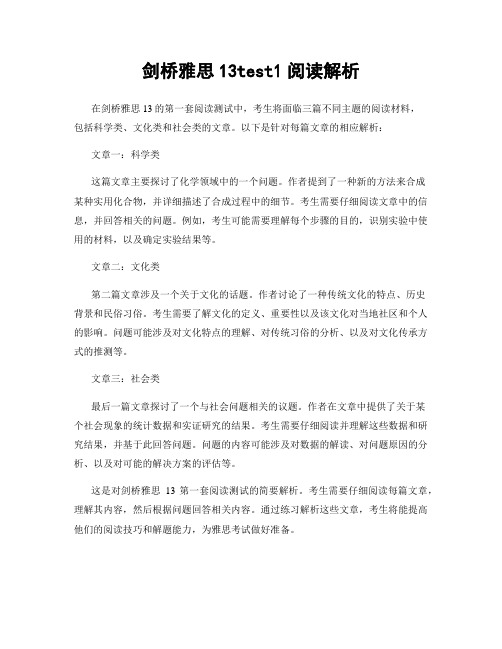
剑桥雅思13test1阅读解析
在剑桥雅思13的第一套阅读测试中,考生将面临三篇不同主题的阅读材料,
包括科学类、文化类和社会类的文章。
以下是针对每篇文章的相应解析:文章一:科学类
这篇文章主要探讨了化学领域中的一个问题。
作者提到了一种新的方法来合成
某种实用化合物,并详细描述了合成过程中的细节。
考生需要仔细阅读文章中的信息,并回答相关的问题。
例如,考生可能需要理解每个步骤的目的,识别实验中使用的材料,以及确定实验结果等。
文章二:文化类
第二篇文章涉及一个关于文化的话题。
作者讨论了一种传统文化的特点、历史
背景和民俗习俗。
考生需要了解文化的定义、重要性以及该文化对当地社区和个人的影响。
问题可能涉及对文化特点的理解、对传统习俗的分析、以及对文化传承方式的推测等。
文章三:社会类
最后一篇文章探讨了一个与社会问题相关的议题。
作者在文章中提供了关于某
个社会现象的统计数据和实证研究的结果。
考生需要仔细阅读并理解这些数据和研究结果,并基于此回答问题。
问题的内容可能涉及对数据的解读、对问题原因的分析、以及对可能的解决方案的评估等。
这是对剑桥雅思13第一套阅读测试的简要解析。
考生需要仔细阅读每篇文章,理解其内容,然后根据问题回答相关内容。
通过练习解析这些文章,考生将能提高他们的阅读技巧和解题能力,为雅思考试做好准备。
剑桥雅思15test1阅读解析
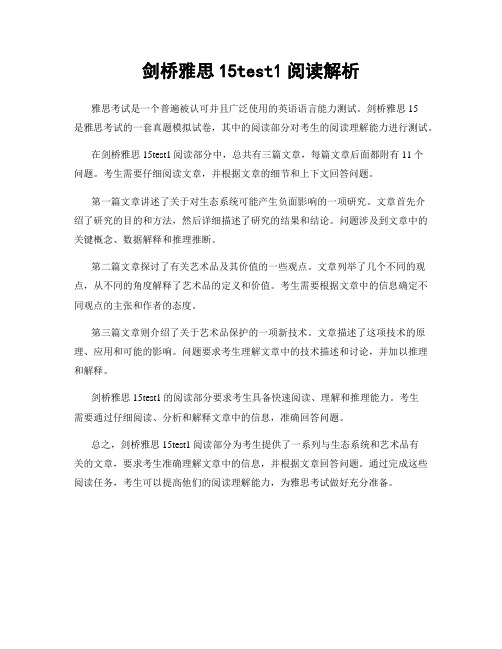
剑桥雅思15test1阅读解析
雅思考试是一个普遍被认可并且广泛使用的英语语言能力测试。
剑桥雅思15
是雅思考试的一套真题模拟试卷,其中的阅读部分对考生的阅读理解能力进行测试。
在剑桥雅思15test1阅读部分中,总共有三篇文章,每篇文章后面都附有11个
问题。
考生需要仔细阅读文章,并根据文章的细节和上下文回答问题。
第一篇文章讲述了关于对生态系统可能产生负面影响的一项研究。
文章首先介
绍了研究的目的和方法,然后详细描述了研究的结果和结论。
问题涉及到文章中的关键概念、数据解释和推理推断。
第二篇文章探讨了有关艺术品及其价值的一些观点。
文章列举了几个不同的观点,从不同的角度解释了艺术品的定义和价值。
考生需要根据文章中的信息确定不同观点的主张和作者的态度。
第三篇文章则介绍了关于艺术品保护的一项新技术。
文章描述了这项技术的原理、应用和可能的影响。
问题要求考生理解文章中的技术描述和讨论,并加以推理和解释。
剑桥雅思15test1的阅读部分要求考生具备快速阅读、理解和推理能力。
考生
需要通过仔细阅读、分析和解释文章中的信息,准确回答问题。
总之,剑桥雅思15test1阅读部分为考生提供了一系列与生态系统和艺术品有
关的文章,要求考生准确理解文章中的信息,并根据文章回答问题。
通过完成这些阅读任务,考生可以提高他们的阅读理解能力,为雅思考试做好充分准备。
- 1、下载文档前请自行甄别文档内容的完整性,平台不提供额外的编辑、内容补充、找答案等附加服务。
- 2、"仅部分预览"的文档,不可在线预览部分如存在完整性等问题,可反馈申请退款(可完整预览的文档不适用该条件!)。
- 3、如文档侵犯您的权益,请联系客服反馈,我们会尽快为您处理(人工客服工作时间:9:00-18:30)。
雅思阅读测试卷TEACHING IN UNIVERSITIESIn the 19th century, an American academic, Newman, characterised a university as: "a place of teaching universal knowledge...(a place for) the diffusion and extension of knowledge rather than its advancement."Newman argued that if universities were not for teaching but rather for scientific discovery, then they would not need students.Interestingly, during this century, while still teaching thousands of students each year, the resources of most universities have been steadily channelled away from teaching into research activities. Most recently, however, there have been strong moves in both North America and the United Kingdom to develop initiatives that would enhance the profile of the teaching institutions of higher education. In the near future, therefore, as well as the intrinsic rewards gained from working with students and the sense that they are contributing to their overall growth and development, there should soon be extrinsic rewards, in the form of job promotion, for those pursuing academic excellence in teaching in universities.In the future, there will be more focus in universities on the quality of their graduates and their progression rates. Current degree courses, whose assessment strategies require students to learn by rote and reiterate the course material, and which do not require the student to interact with the material, or construct a personal meaning about it or even to understand the discipline, are resulting in poor learning outcomes. This traditional teaching approach does not take into account modern theories of education, the individual needs of the learner, nor his or her prior learning experience.In order for universities to raise both the quality and status of teaching, it is first necessary to have some kind of understanding of what constitutes good practice. A 1995 report, compiled in Australia, lists eight qualities that researchers agree are essential to good teaching.Good teachers...A are themselves good learners - resulting in teaching that is dynamic, reflective and constantly evolving as they learn more and more about teaching;B display enthusiasm for their subject and the desire to share it with their students;C recognise the importance of context and adjust their teaching accordingly;D encourage deep learning approaches and are concerned with developing their students' critical thinkingskills, problem-solving skills and problem-approach behaviours;E demonstrate an ability to transform and extend knowledge, rather than merely transmit it;F recognise individual differences in their students and take advantage of these;G set clear goals, use valid assessment techniques and provide high-quality feedback to their students;H show respect for, and interest in, their students and sustain high expectations of them.In addition to aiming to engage students in the learning process, there is also a need to address the changing needs of the marketplace. Because in many academic disciplines the body of relevant knowledge is growing at an exponential rate, it is no longer possible, or even desirable, for an individual to have a complete knowledge base. Rather, it is preferable that he or she should have an understanding of the concepts and the principles of the subject, have the ability to apply this understanding to new situations and have the wherewithal to seek out the information that is needed.As the world continues to increase in complexity, university graduates will need to be equipped to cope with rapid changes in technology and to enter careers that may not yet be envisaged, with change of profession being commonplace. To produce graduates equipped for this workforce, it is essential that educators teach in ways that encourage learners to engage in deep learning which may be built upon in the later years of their course, and also be transferred to the workplace.The new role of the university teacher, then, is one that focuses on the students' learning rather than the instructor's teaching. The syllabus is more likely to move from being a set of learning materials made up oflecture notes, to a set of learning materials made up of print, cassettes, disks and computer programs. Class contact hours will cease to be the major determinant of an academic workload. The teacher will then be released from being the sole source of information transmission and will become instead more a learning manager, able to pay more attention to the development and delivery of education rather than content.Student-centred learning activities will also require innovative assessment strategies. Traditional assessment and reporting has aimed to produce a single mark or grade for each student. The mark is intended to indicate three things: the extent to which the learned material was mastered or understood; the level at which certain skills were performed and the degree to which certain attitudes were displayed.A deep learning approach would test a student's ability to identify and tackle new and unfamiliar 'real world' problems. A major assessment goal will be to increase the size and complexity of assignments and minimise what can be achieved by memorising or reproducing content. Wherever possible, students will be involved in the assessment process to assist them to learn how to make judgements about themselves and their work. Questions 15-18Do the following statements agree with the information given in Reading Passage 2? In boxes 15-18 on your answer sheet writeTRUE if the statement agrees with the information FALSE if the statement contradicts the information NOT GIVEN if there is no information on this15 Newman believed that the primary focus of universities was teaching.16 Job promotion is already used to reward outstanding teaching.17 Traditional approaches to assessment at degree level are having a negative effect on the learning process.18 University students have complained about bad teaching and poor results.Questions 19-23Look at the eight qualities A-H of 'good teachers' in Reading Passage 2 and the statementsbelow (Questions 19-23).Match each quality to the statement with the same meaning.Write the correct letter A-H in boxes 19-23 on your answer sheet.Good teachers19 can adapt their materials to different learning situations.20 assist students to understand the aims of the course.21 are interested in developing the students as learners.22 treat their students with dignity and concern.23 continually improve their teaching by monitoring their skills.Questions 24-27 Choose the correct letter, A,B,C or DWrite your answers in boxes 24-27 on your answer sheet.24 In the future, university courses will focus more onA developing students’ skills and concepts.B expanding students' knowledge.C providing work experience for students.D graduating larger numbers of students.25 According to the author, university courses should prepare students toA do a specific job well.B enter traditional professions.C change jobs easily.D create their own jobs.26 The author believes that new learning materials in universities will result inA more work for teachers.B a new role for teachers.C more expensive courses.D more choices for students.27 The author predicts that university assessment techniques will include moreA in-class group assignments.B theoretical exams.C problem-solving activities.D student seminar presentations.。
